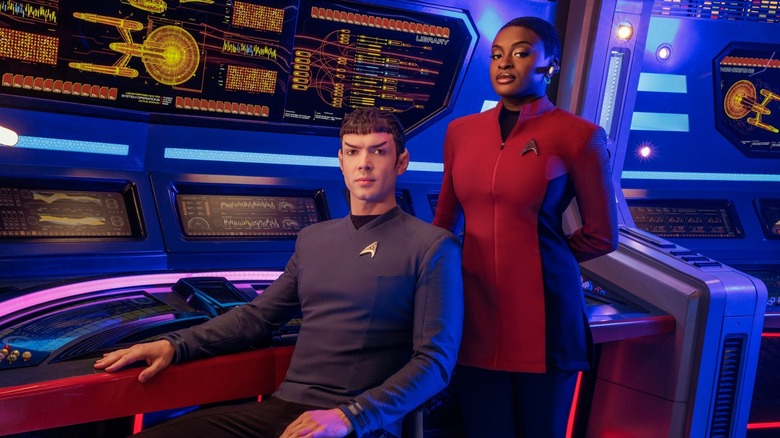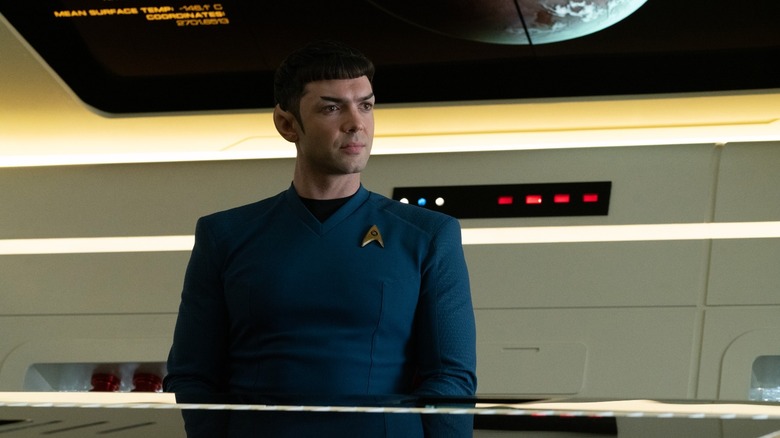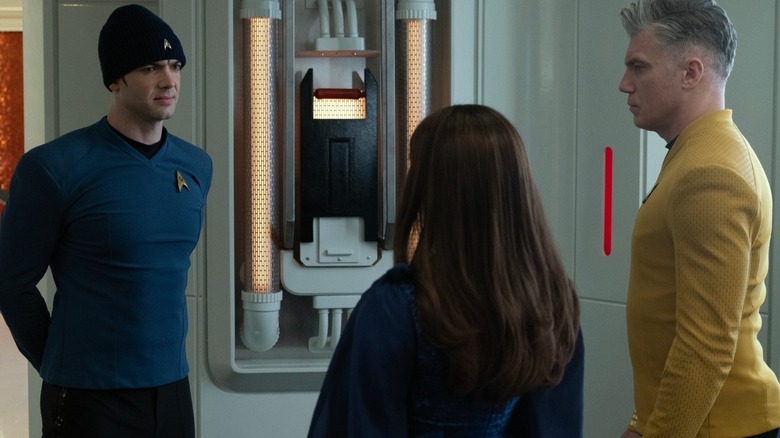Star Trek: Strange New Worlds Has A 'Spock Scale' That Should Never Go To Ten
"Star Trek: Strange New Worlds," currently wrapping up its second ten-episode season, has stood apart from the many other "Star Trek" shows by possessing a much lighter, more genial tone than its immediate predecessors. Since 2009, "Star Trek" has been largely dour, violent, and dark. Some of the more recent episodes of "Star Trek: Discovery" and "Star Trek: Picard" have contained many, many murders, and the Kelvin-verse movies have been hyperactive action pictures (one of them is even called "Star Trek Into Darkness"). It's telling that the better Trek shows of more recent vintage have been more or less comedy shows. "Star Trek: Lower Decks" is a 30-minute animated "Star Trek" sitcom, while "Strange New Worlds" is lighter — literally; the set is more brightly lit — and features stories that verge on the silly. In "The Elysian Kingdom," the characters are all magically transformed into Ren Faire characters. In "Charades," Spock (Ethan Peck) is transformed into a human right before an important dinner with his future in-laws.
Spock is an interesting case, as the emotionless half-Vulcan science officer has historically been stone-faced, cold, and eminently logical. Throughout the original "Star Trek" he was distant and alien. He occasionally broke down and showed human emotions, but they were brief lapses in his ordinarily stolid judgment.
On "Strange New Worlds," however, Spock is far ... warmer. Although this is a slightly younger version of the character seen in the 1960s, he seems friendlier, more open to human love, and is, as of this season, experimenting with laughter, smiling, and making jokes.
However, the showrunners are careful not to let Spock become so emotional that his logical character is betrayed. Indeed, "Charades" director Jordan Canning recently told Inverse that there is a sliding "Spock Scale" that shan't be pushed.
The Spock Scale
As mentioned, "Charades" is about how Spock is transformed into a human. After suffering a shuttlecraft accident, a species of noncorporeal aliens have to tend to Spock's wounds. The species, however, is confused by Spock's human and Vulcan DNA, and remix his genes to match the human Nurse Chapel (Jess Bush) who was traveling with him. Becoming human causes Spock to enter a tempestuous, adolescent state. His appetite for food increases, he is prone to fits of anger, and his libido increases. And his transformation is days before his distant fiancée is scheduled to visit ... with her parents. Despite the sci-fi twist, this is a crisis worthy of a 1950s sitcom.
Jordan Canning pointed out that Spock needs to remain as Vulcan as possible most of the time, otherwise his human behavior in "Charades" wouldn't read well. She described it thus:
"It's kind of Spock's teenage moment. [...] But Ethan and I had to come up with 'Spock scale,' to make sure he didn't get too human. A zero would be fully Vulcan. A five would be totally human. We'd never want to see a ten!"
In "Charades," Spock is at a five. In the original Trek, the character (as played by Leonard Nimoy) most often hovered between zero and one with occasional outbursts as high as four. On "Strange New Worlds," he's more of a 2, given his general friendliness. In the Kelvin-verse movies, Spock (as played by Zachary Quinto) is more solidly 6 or 7, appearing to be in a common state of anger and given to savagely beating bad guys on the roof of a speeding bus.
Turning away from Nimoy
Later in the interview, Peck himself admitted that he is trying to forge his own way with the character, free from the confines of the actors that preceded him. This version of Spock — and, indeed, most of the "Strange New Worlds" characters — first appeared as central supporting players in the second season of "Star Trek: Discovery." Back then, Peck says, he knew that he would be compared to Nimoy a lot and looked to the late actor's performance for guidance.
Now that Peck has played Spock for 20 episodes, he feels he can make Spock his own. He said:
"I haven't spent much time with Nimoy's Spock since before I was preparing for 'Discovery.' A little bit before 'Strange New Worlds,' season one. He felt alive in me at the point we got to season two. I discovered something of Spock in me. The human Spock is me. Spock learns from Ethan, and Ethan learns from Spock. We're sort of inseparable."
A lot of that humanity may still show. As of this writing, the episode "Subspace Rhapsody" is about to air, and that — in a twist worthy of "Buffy the Vampire Slayer" — will be a full-on musical episode. It remains to be seen if Peck will sing a number or not, or if he will be wholly passionate about it. If "Strange New Worlds" continues for several more seasons, it will be fascinating to witness this warmer version of Spock line up with the Spock we've known for 57 years.


